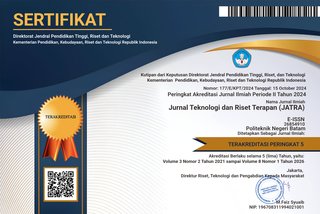Pengujian Sulphide Stress Corrosion Cracking Pada Sambungan Las API 5L X65 dan ASTM A694 F65
DOI:
https://doi.org/10.30871/jatra.v3i2.3029Keywords:
Corrosion, Sulphide, Crack, Stress, GTAWAbstract
Corrosion is a problem that always occurs in metals in their application to the environment. Although there are already several other substitute materials such as polymers and composites, the use of metals is still very much needed and plays an important role, especially in the oil and gas fabrication industry. Corrosion cannot be avoided but can be minimized because of the nature of the metal that will return to its origin. Metals used in the oil and gas fabrication industry require a material test against stress factors and the environment. The SSCC (Sulphide Stress Corrosion Cracking) test based on NACE TM0316 is a test of material resistance to stress and acidic environments. In this SSCC test, the method used is Four-Point Bending, which means that there are four roller jigs to bend the specimen. The specimens used are API 5L X65 pipe welded joint specimens and ASTM A694 flange. The welding process on this specimen uses the GTAW (Gas Tungsten Arc Welding) process. The specimens tested have several stages, starting from the preparation of the machined material, cleaning, then bending to soaking in an acidic liquid. This aims to determine the indications that appear on the surface of the specimen in the form of cracks in both the weld and the base metal. The test used three specimens with different IPRR welding processes. Specimens 1 and 3 are accepted specimens, while specimen 2 is rejected specimens based on the SSCC DNV Test Procedure, where the acceptance criteria from the MPI results are acceptable if the indication is less than 1 mm in length.
Downloads
References
NACE TM0316 "“ Four-Point Bend Testing of Materials for Oil and Gas Applications, 2016.
NACE TM0177 "“ Laboratory Testing Materials of Metals for Resistance to Sulfide Stress Cracking and Stress Corrosion Cracking in H2S Environments Section 6 Test Solution A, 2016.
DNVGL Test Procedure Rev 01, 2019.
DNVGL SSC Test of Welded, 2019.
Brustad, S., Løken, K.-P., and J.G. Waalmann. "Hydrate Prevention using MEG instead of MeOH: Impact of experience from major Norwegian developments on technology selection for injection and recovery of MEG." Paper presented at the Offshore Technology Conference, Houston, Texas, May 2005. doi: https://doi.org/10.4043/17355-MS.
"Fundamentals of Corrosion", Philip A. Schewitzer, Taylor and Francis Group, Boca Raton, Florida, United States of America, 2010.
Octal Steel. API 5L Specification. https://www.octalsteel.com/resources/api-5l-x65-pipe
Abbey Forged Products. ASTM A694 F65 Specification. http://www.abbeyforgedproducts.co.uk/images/downloads/PDF/ASTM-A694-F65.pdf
API Specification 5L Forty Sixth Edition, April 2018.
ASTM A694 - Standar Specification for Carbon and Alloy Steel Forgings for Pipe Flanges, Fittings, Vales, and Parts for High-Pressure Transmission Service, 2016.
TWI CSWIP 3.1 "“ Certification Welding Inspector, Cambridge CB 21 6AL, United Kingdom.
Additional Files
Published
How to Cite
Issue
Section
License
Copyright (c) 2021 Jurnal Teknologi dan Riset Terapan (JATRA)

This work is licensed under a Creative Commons Attribution-NonCommercial-ShareAlike 4.0 International License.




11.jpg)











